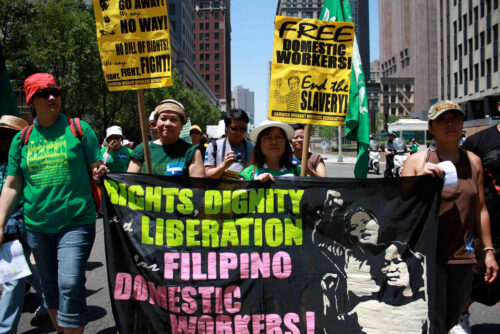In this paper, I briefly explore the increasingly heteronormative framing of gendered global migration in recent research works in the area. 1 The study of the so-called “feminization” of global migration is best exemplified in the chain of care migration paradigm. This paradigm, established by social scientists, focuses on the movement of Third World female migrants to the First World as domestic workers to take care of children and the elderly. “Chain of care” pivots around a disturbing process of gendering that is based on the deployment of normative conceptions of care, love, and other emotions.
But before I launch into my argument, I want to briefly acknowledge the location of gender in relation to research on global migration. Gender, in particular, has only been recently given proper attention in migration studies. I participated in a much-needed critical assessment of the works on gender and migration to date in a Social Science Research Council sponsored working group together with anthropologist Patricia Pessar, historian Donna Gabaccia, sociologist Katharine Donato and political scientist Jennifer Holdaway. In our co-edited special issue of the International Migration Review 2, we explored how the various social science disciplines were engaging with the gender question in migration. Our findings show that some disciplines such as anthropology, history and sociology have been at the forefront of engaging gender in migration studies, but others, such as economics, were rather slow to engage with this issue. In their trenchant review and agenda-setting essay on ethnography-based scholarship in this volume, anthropologists Patricia Pessar and Sarah Mahler 3 put forward a very productive view of gender as “relational,” “contextualized” and “multi-scalar.” They both caution, echoing a previous review of the field by Hodagneu Sotelo 4, that in the process of “writing in” women’s experiences in migration, gender not be equated with “woman.”
It would seem that this very simple yet vital precaution is not being heeded by researchers conducting research on global domestic labor as they proceed to examine the emotional underpinnings of the work involved in this industry. This focus on emotional labor is part of the “affective turn” (as one recently published book terms it) in both the humanities and social sciences that has been both a source of concern and celebration. It is undeniable that a focus on feelings and emotions can be rewarding particularly as it may reveal structures of power. Many scholars agree that gender and emotions are a crucial tandem that enables the productive analysis and understanding of contemporary social arrangements, particularly global labor flows.
As I have mentioned above, my own specific preoccupation on this matter has been about recent research on the global movement of Third World women to the First World to work as nannies and maids as contextualized by the formation of the “chain of care.” This conceptual framework is constituted by structured relationships formed through the flow and displacement of maternal affect. My purpose here is not to disparage notable works on domestics; they all have made important interventions. Rather, I want to initiate a critical dialogue around the politics of affect that may push the research into a more creative and expansive stage.
In the book Global Woman, the editors Barbara Ehrenreich and Arlie Russell Hochschild 5 point to the emerging and unequal flow of affect between the Third World and First World. The “chain of care” is a linear concatenation of bodies and feelings propelled by the migration of Third World women to the First World. Third World women are torn away from their biological families and forced to leave their children in the care of poorer women in the homeland, to take care of the progeny of modern working mothers of the first world. Therefore, the authors suggest, Third World women take on the burden of First World women’s liberation from domesticity by providing emotional and physical labor needed at the homes of the latter. This situation, they argue, causes a “care drain” and a “global heart transplant,” where the global domestic labor market siphons off affective energies away from the poor countries of the world as Third World women fracture households and leave families motherless and wifeless. Therefore, this “chain” is forged primarily through affective links constituted by biologically reproducing women of the First and Third Worlds and the displacement of their affective and physical labor from their biological families. The glue that keeps this chain together in a linear fashion is the heterosexualized bodies of both First and Third women while the fuel for the global dispersal of migratory domestic labor is normative maternal love. Therefore, the chain of care framework foregrounds the pathos of dislocated biological motherhood.
- Among such works include but not limited to: Pei-Chia Lan, Global Cinderellas: Migrant Domestics and Newly Rich Employers in Taiwan. Durham, NC: Duke University Press, 2006. Rhacel Parrenas, Servants of Globalization: Women, Migration and Domestic Work. Palo Alto, CA: Stanford University Press, 2001. Nicole Constable, Maid to Order in Hong Kong: Stories of Filipina Workers. Ithaca, NY: Cornell University Press, 1997.[↑]
- Katharine Donato , Donna Gabbacia, Jennifer Holdaway, Martin Manalansan and Patricia Pessar, “Gender and Migration Revisited,” International Migration Review, 40:1.[↑]
- Sarah J. Mahler and Patricia R. Pessar, “Gender Matters: Ethnographers Bring Gender to the Periphery Toward the Core of Migration Studies.” International Migration Review 40:1: 27-63.[↑]
- Pierrette Hodagneu-Sotelo, “Introduction: Gender and Contemporary U.S. Immigration” American Behavioral Scientist 42:2: 565-576.[↑]
- Barbara Ehrenreich and Arlie Hochschild, Global Woman: Nannies, Maids and Sex Workers in the New Economy. New York: Metropolitan Books, 2003.[↑]



